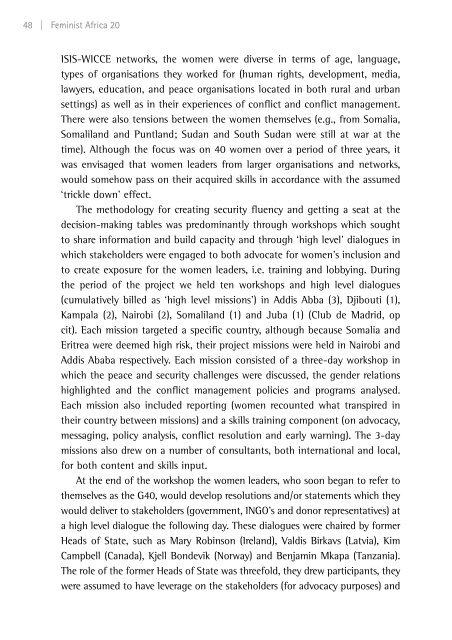Create successful ePaper yourself
Turn your PDF publications into a flip-book with our unique Google optimized e-Paper software.
48 | Feminist Africa 20<br />
ISIS-WICCE networks, the women were diverse in terms of age, language,<br />
types of organisations they worked for (human rights, development, media,<br />
lawyers, education, <strong>and</strong> peace organisations located in both rural <strong>and</strong> urban<br />
settings) as well as in their experiences of conflict <strong>and</strong> conflict management.<br />
There were also tensions between the women themselves (e.g., from Somalia,<br />
Somalil<strong>and</strong> <strong>and</strong> Puntl<strong>and</strong>; Sudan <strong>and</strong> South Sudan were still at war at the<br />
time). Although the focus was on 40 women over a period of three years, it<br />
was envisaged that women leaders from larger organisations <strong>and</strong> networks,<br />
would somehow pass on their acquired skills in accordance with the assumed<br />
‘trickle down’ effect.<br />
The methodology for creating security fluency <strong>and</strong> getting a seat at the<br />
decision-making tables was predominantly through workshops which sought<br />
to share information <strong>and</strong> build capacity <strong>and</strong> through ‘high level’ dialogues in<br />
which stakeholders were engaged to both advocate for women’s inclusion <strong>and</strong><br />
to create exposure for the women leaders, i.e. training <strong>and</strong> lobbying. During<br />
the period of the project we held ten workshops <strong>and</strong> high level dialogues<br />
(cumulatively billed as ‘high level missions’) in Addis Abba (3), Djibouti (1),<br />
Kampala (2), Nairobi (2), Somalil<strong>and</strong> (1) <strong>and</strong> Juba (1) (Club de Madrid, op<br />
cit). Each mission targeted a specific country, although because Somalia <strong>and</strong><br />
Eritrea were deemed high risk, their project missions were held in Nairobi <strong>and</strong><br />
Addis Ababa respectively. Each mission consisted of a three-day workshop in<br />
which the peace <strong>and</strong> security challenges were discussed, the gender relations<br />
highlighted <strong>and</strong> the conflict management policies <strong>and</strong> programs analysed.<br />
Each mission also included reporting (women recounted what transpired in<br />
their country between missions) <strong>and</strong> a skills training component (on advocacy,<br />
messaging, policy analysis, conflict resolution <strong>and</strong> early warning). The 3-day<br />
missions also drew on a number of consultants, both international <strong>and</strong> local,<br />
for both content <strong>and</strong> skills input.<br />
At the end of the workshop the women leaders, who soon began to refer to<br />
themselves as the G40, would develop resolutions <strong>and</strong>/or statements which they<br />
would deliver to stakeholders (government, INGO’s <strong>and</strong> donor representatives) at<br />
a high level dialogue the following day. These dialogues were chaired by former<br />
Heads of State, such as Mary Robinson (Irel<strong>and</strong>), Valdis Birkavs (Latvia), Kim<br />
Campbell (Canada), Kjell Bondevik (Norway) <strong>and</strong> Benjamin Mkapa (Tanzania).<br />
The role of the former Heads of State was threefold, they drew participants, they<br />
were assumed to have leverage on the stakeholders (for advocacy purposes) <strong>and</strong>


